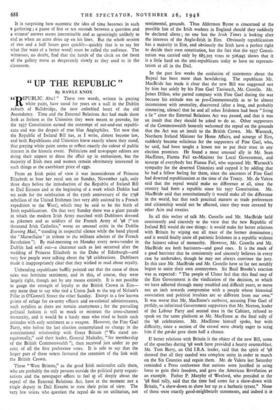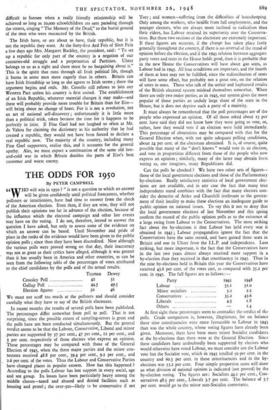"UP THE REPUBLIC"
By FtAWLE KNOX
REPUBLIC Abu!" These two words, written in greying white paint, have stood for years on a wall in the Dublin suburb of Ballsbridge, the now enfeebled heart of the old Ascendancy. Time and the External Relations Act had made them look as forlorn as the Unionists they were meant to provoke, for the 1937 Constitution earned the contempt of out-and-out republi- cans and was the despair of true blue Anglophiles. Yet now that the Republic of Ireland Bill has, as I write, almost become law, and both Republicans and Unionists know exactly where they stand, that greying white paint seems to reflect exactly the colour of public interest in the historic event. Politicians and newspaper editors are doing their utmost to dress the affair up in enthusiasm, but the majority of Irish men and women remain obstinately interested in such things as the exorbitant price of eggs.
From an Irish point of view it was inconsiderate of Princess Elizabeth to bear her royal, son on Sunday, November 14th, only three days before the introduction of the Republic of Ireland Bill to Dail Eireann and at the beginning of a week which Dublin had set aside for the celebration of the rsoth anniversary of the 1798 rebellion of the United Irishmen (not very ably assisted by a French expedition to the West), which may be said to be the birth of Irish republicanism. On that very Sunday there was a giant parade in which the modern Irish Army marched with Dubliners dressed as pikemen and as soldiers of the French Army of '98 (" ten thousand Irish Catholics," wrote an unusual critic in the Dublin Evening Mail," standing in respectful silence while the band played the Marseillaise ' in tribute to the militant atheists of the French Revolution"). By mid-morning on Monday every news-vendor in Dublin had sold out—a clearance such as last occurred after the wedding of Princess Elizabeth to the Duke of Edinburgh—and very few people were talking about the '98 celebrations. Dubliners made it inappropriately clear that they wished to read about royalty.
Unbending republicans huffily pointed out that the cause of these sales was feminine sentiment, and in this, of course, they were largely right, though not by any means entirely. It is not possible to gauge the strength of loyalty to the British Crown in Eire— any more than to say who tied a Union Jack to the top of Nelson's Pillar in O'Connell Street the other Sunday. Except in a few known points of refuge for ex-army officers and ex-colonial administrators, such royalists as there are remain anonymous ; for the prevailing political fashion is still to mock or mistrust the cross-channel monarchy, and it would be a hardy man who tried to battle such attitudes with only sentiment as a weapon. However, the Fine Gael Party, who before the last election contemplated no change in the constitutional relationship with Great Britain (" We stand un- equivocally," said their leader, General Mulcahy, "for membership of the British Commonwealth"), then received just under 20 per cent, of all the first preference votes. It is safe to say that the larger part of these voters favoured the retention of the link with the British Crown.
These "West Britons," as the good Irish nationalist calls them, who are probably the only persons outside the political party organi- sations and the newspaper offices to feel at all deeply about the repeal of the External Relations Act, have at the moment not a single deputy in Dail Eireann to state their point of view. The very few voices who question the repeal do so on utilitarian, not
sentimental, grounds. Thus Alderman Byrne is concerned at the possible fate of the Irish workers in England should they suddenly be declared aliens ; no one but the Irish Times is looking after the interests of the Anglo-Irish in Eire. Obviously republicanism has a majority in Eire, and obviously the Irish have a perfect right to decide their own constitution, but the fact that the 1937 Consti- tution was carried only by 685,105 votes to 526,945 shows that it is a tittle hard on the anti-republicans today to have no represen- tation at all in the Dail.
In the past few weeks the confusion of statements about the Repeal has been more than bewildering. The republican Mr. MacBride has made it clear that the new Bill was suggested not by him but solely by his Fine Gad Taoiseach, Mr. Costello. Mr. James Dillon, who parted company with Fine Gad during the war because his attitude was so pro-Commonwealth as to be almost inconsistent with neutrality, discovered (after a long, and probably simmering, silence) that he and all other Irishmen had been "living a lie" since the External Relations Act was passed, and that it was an insult that they should be asked to do so. Other supporters of the Commonwealth honestly welcomed the repeal on the grounds that the Act was an insult to the British Crown. Mr. Warnock, Northern Ireland Minister for Home Affairs, and scourge of Eire, suddenly became solicitous for the supporters of Fine Gad, who, he said, had been taught a lesson not to put their trust in any election promises. He found a most unusual ally in Mr. Sean MacEntee, Fianna Fail ex-Minister for Local Government, and scourge of everybody but Fianna Fail, who repeated Mr. Warnock's sympathy for the deserted Unionists and capped it by adding that he had a fellow feeling for them, since the ancestors of Fine Gael had deserted republicanism at the time of the Treaty. Mr. de Valera said that the repeal would make no difference at all, since the country had been a republic since his 1937 Constitution. Mr. MacBride said that constitutionally it would make all the difference in the world, but that such practical matters as trade preferences and citizenship would not be affected, since they were covered by other Acts and treaties.
In all this welter of talk Mr. Costello and Mr. MacBride held consistently and sincerely to the view that the new Republic of Ireland Bill would do two things: it would make for better relations with Britain by wiping out all trace of the former domination ; and it would finally unite all patriotic Irishmen in a republic without the faintest odour of monarchy. However, Mr. Costello and Mr. MacBride are both barristers—and good ones. It is the mark of a good barrister that he consistently and sincerely believes in every case he undertakes, though he may not always convince the jury. In this case Mr. MacBride and Mr. Costello have so far not notably begun to unite their own countrymen. Sir Basil Brooke's reaction was as expected: "The people of Ulster feel that this final step of the Eire Government is the vindication of the decision, to which we have adhered through many troubled and difficult years, to move not an inch towards compromise with a people whose historical association and political loyalties are so different from our own." It was worse that Mr. MacEntee's outburst, accusing Fine Gad of perfidy, so infuriated Government supporters that Mr. Norton, leader of the Labour Party and second man in the Cabinet, refused to speak on the same platform as Mr. MacEntee at the final rally of the '98 celebrations. Mr. MacEntee himself spoke, but with difficulty, since a section of the crowd were clearly eager to scrag him if the gardai gave them half a chance.
If better relations with Britain is the object of the new Bill, some of the speeches during '98 week have provided a hearty counterblast. Mr. Tom Barry, an Old I.R.A. leader, said that the spirit of '98 showed that all they needed was complete unity in order to march on the Six Counties and regain them. Mr. de Valera last Saturday reminded a Press conference that nations were justified in using force to gain their freedom, and gave the American Revolution as an example. Father P. Murphy of Wexford, who presided at the '98 final rally, said that the time had come for a show-down with Britain, "a show-down to show her up as a barbaric tyrant." None of these were exactly good-neighbourly statements, and indeed it is
difficult to foresee when a really friendly relationship will be achieved so long as 20,000 schoolchildren are sent parading through the streets, singing "The Memory of the Dead," to the burial ground of the men who were massacred by the British.
The Irish have, or are about to have, their republic, but it is not the republic they want. At the forty-first Ard Feis of Sinn Fein a few days ago Mrs. Margaret Buckley, the president, said: "To set up a republic for only part of the country is a negation of our centuries-old struggle and a perpetuation of Partition. Ulster belongs to us as a right and there must be no bargaining about it." This is the spirit that runs through all Irish political life, though it burns in some men more eagerly than in others. Britain can have Irish friendship so long as she agrees to Irish terms ; there the argument begins and ends. Mr. Costello still refuses to join any Western Pact unless his country is first united. The establishment of an Irish Republic, whatever material changes it may make—and these will probably provide more trouble for Britain than for Eire— will bring about no change of heart. For it is not a revolution, not an act of national self-discovery ; unfortunately it is little more than a political trick, taken because the time for it happens to be perfectly in joint. If Fine Gael had not laughed so often at Mr. de Valera for claiming the dictionary as his authority that he had created a republic, they would not have been forced to declare a real republic now. The majority of the country, including many Fine Gael supporters, realise this, and it accounts for the general apathy. Alas, we must expect a continuation of the same old hot- and-cold war in which Britain doubles the parts of Eire's best customer and worst enemy.





































 Previous page
Previous page